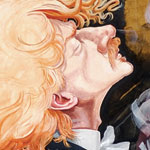
 (November 6, 1860- June 21, 1941)
(November 6, 1860- June 21, 1941)
Jan Paderewski (pronounced Yahn Pad-uh-REV-skee) was born on a pleasant and well-to-do farm in southern Poland. His mother died when he was young and his father was banished to Siberia for several years for protesting against the Russian control of Poland, so Jan and his sister were left to themselves for much of their early lives. Throughout his childhood, whenever he was able, Jan would play from memory what he had heard others play on the piano. Once a month a teacher from the nearby town would come to give the two siblings piano lessons but it wasn't until Paderewski was twelve, when he left his father's farm to go to school in Warsaw, that he was able to take regular lessons.
Because much of his early learning was self-taught Paderewski developed poor form which, despite years of lessons and rehearsal, he never completely lost. When he was sixteen he traveled to Russia on his first concert tour but, because he did not know the music that he was playing and had little technique, he found himself improvising through the sections that he had not memorized. His audiences were forgiving but his teachers told him that he should consider other options because he would never become a concert pianist.
Paderewski ignored this advice and began performing in 1885. Critics and serious musicians thought his passionate style was simply pounding on the piano, but audiences loved him. Because of his good looks and outgoing personality women began to crowd around him, often screaming and fainting as he entered and left concerts, a phenomenon that newspapers termed "Paddymania." In 1890 he premiered in London and then in 1891 his premiere in New York was so popular that he ended up playing well over 115 concerts in three months - over a concert a day. Eventually Paderewski became the highest paid and most famous pianist of his or any previous time period. The amount that he was paid per performance remains among the highest paid for pianists since.
Intensely patriotic, Paderewski was heavily involved in Polish politics. Because of his fame, he was able to rally the country's leaders into the first sovereign parliament since the eighteenth century. He became the Prime Minister of the first independent Polish government in 1919 and signed the Treaty of Versailles as the representative for his country. Political life was intensely difficult for Paderewski, though, and larger forces were against Poland which was being considered a buffer between Germany and Russia at the time. In 1921 he retired as Prime Minister and returned to performing. Throughout the 1930s he toured extensively throughout Europe, the United States, Australia, and New Zealand and used the enormous profits from his concerts to support the efforts for Polish freedom. In 1940 he was appointed leader of the Polish National Council.
In 1941 he became ill while in New York City and died quietly there in his home. In his will Paderewski requested that he be buried temporarily in the United States and, once Poland was free, that his body be transported to his homeland for its final resting place. President Franklin D. Roosevelt authorized his burial in the battleship Maine memorial at Arlington National Cemetery and, despite multiple requests from communist leaders over the next 50 years, his request was honored by each successive American president. In 1992, after Poland finally achieved freedom, Paderewski's remains were transported with much celebration to the country that he had so loved.
Resources
Finck, Henry T. Paderewski and His Art. New York: Whittingham & Atherton, 1895.
Written during Paderewski's lifetime, this short book gives a variety of anecdotal information about the pianist, his family, and his performance history up until the time of publication.
Newspaper accounts of Paderewski's internment and the political issues surrounding the transportation of his remains to his homeland. Many of the accounts contain summaries of his performance career and work on behalf of his country.
Beveridge, Ann. "Grand Dame of Showbiz Still Draws the Crowds." The Daily Telegraph (Sydney, Australia) on the Web 7 May 2004. Academic Search Premier. EBSCO. http://search.epnet.com/login.aspx?direct=true&db=aph&an=1075932 21 Sept. 2007.
Clements, Andrew. "Film & Music: Classical: CD Reviews: Paderewski." The Guardian (London) on the Web 17 Aug. 2007. Academic Search Premier. EBSCO. http://search.epnet.com/login.aspx?direct=true&db=aph&an=1075932 21 Sept. 2007.
Kraglund, John. "More a Biography of Poland than of a Musician-Statesman. Fascinating Paderewski." The Globe and Mail (Canada) on the Web 22 Dec. 1982. Academic Search Premier. EBSCO. http://search.epnet.com/login.aspx?direct=true&db=aph&an=1075932 21 Sept. 2007.
McLellan, Joseph. "A Music Man's Mystique." The Washington Post on the Web 13 Nov. 1982. Academic Search Premier. EBSCO. http://search.epnet.com/login.aspx?direct=true&db=aph&an=1075932 21 Sept. 2007.
Moore, Christopher. "Paddymania Chch [sic] Centenary of Paddymania." The Press (Christchurch, New Zealand) on the Web 8 Sept. 2004. Academic Search Premier. EBSCO. http://search.epnet.com/login.aspx?direct=true&db=aph&an=1075932 21 Sept. 2007.
Pettit, Stephen. "On Record." Sunday Times (London) on the Web. 29 Nov. 1998. Academic Search Premier. EBSCO. http://search.epnet.com/login.aspx?direct=true&db=aph&an=1075932 21 Sept. 2007.
Schonberg, Harold. "Musicians' Disabilities Provoke Medical Study." The New York Times on the Web 27 Aug. 1983. Academic Search Premier. EBSCO. http://search.epnet.com/login.aspx?direct=true&db=aph&an=1075932 21 Sept. 2007.
Stevens, David. "The Great Pianists, Alive on Film." International Herald Tribune (Neuilly-sur-Seine, France) on the Web 25 Feb. 1998. Academic Search Premier. EBSCO. http://search.epnet.com/login.aspx?direct=true&db=aph&an=1075932 21 Sept. 2007.